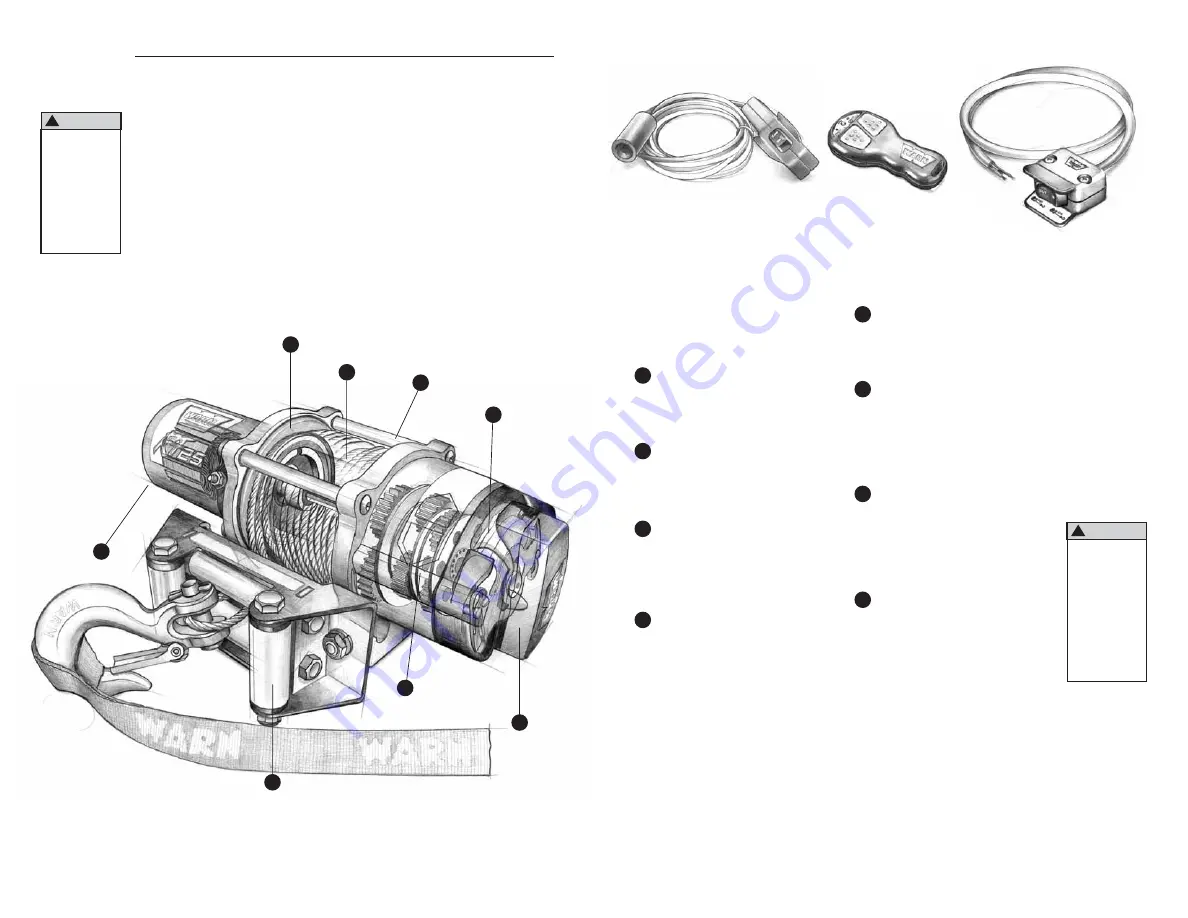
G O P R E P A R E D
™
7
WARN INDUSTRIES • THE BASIC GUIDE TO WINCHING TECHNIQUES
G O P R E P A R E D
™
6
WARN INDUSTRIES • THE BASIC GUIDE TO WINCHING TECHNIQUES
4
So, you have your Warn winch and
you’re ready to get out on the trails: climb
a few boulders, splash a little mud,
traverse the occasional stream. Basically,
you’re ready to explore the backcountry
and otherwise have a great time.
Well, if you’re smart enough to go
prepared with the best, you’re probably
smart enough to know that to keep
having a great time, you need to fully
understand your winch and the winching
operation.
That’s exactly what this guide intends
to do: provide you with a basic under-
standing of your winch and teach you the
basics of proper winching techniques.
But before we get started, we must
emphasize that the information in this
guide is general in nature. Because no
two situations are alike, it would be
nearly impossible to review them all. We
can, however, provide you with the
general principles and techniques. Then
it is up to you to take the time to analyze
the situation and apply the proper
technique.
Along with a little common sense, the
guidelines laid out in this book can help
you keep off-roading fun. Just remember
to think through each situation before you
act and TREAD LIGHTLY!
Structural
components of a
planetary gear
winch
1
5
2
6
3
7
8
Never operate
or install a
winch without
reading or
understanding
the operator’s
manual
!
WARNING
To start, you should familiarize
yourself with your Warn winch and each
of its components: Practice using your
winch before using it on the trail.
Motor
Typically the winch motor is
powered by the vehicle’s battery. The
motor provides power to the gear
mechanism, which turns the winch drum
and winds the rope.
Winch Drum
The winch drum is the
cylinder onto which the rope feeds. The
drum is driven by the motor and drive
train. Its direction can be changed using
the winch switch.
Wire / Synthetic Rope
The rope’s
diameter and length are determined by
the winch’s load capacity and design.
Wrapped around the winch drum and fed
through the fairlead, the rope is looped at
the end to accept the hook’s clevis pin.
Fairlead
When using the winch at
an angle, the fairlead (or wire lead) acts
to guide the rope onto the spooling drum.
It minimizes damage to the rope while it
goes through the winch mount or
bumper.
Gear Train
The reduction gear
converts the winch motor power into a
large pulling force. The gear train design
makes it possible for the winch to be
lighter and more compact.
Braking System
Braking action is
automatically applied to the winch drum
when the winch motor is stopped and
there is load on the rope. The braking
action is applied by the motor or a
separate mechanical brake, depending
on the winch construction.
Clutch
The clutch allows the
operator to manually disengage the
spooling drum from the gear train,
enabling the drum to rotate freely (known
as “freespooling”). Engaging the clutch
“locks” the winch drum back onto the
gear train.
Tie Rods
Ties the end housings
together as a structural unit.
1
5
2
6
3
7
8
4
Winch controls
come in many
forms. All enable
the operator to
start, stop and
change the
direction of the
winch drum
rotation.
Remote Control Switch
Rocker Switch
Never engage
or disengage
the clutch if
winch is under
load, rope is in
tension, or
rope drum is
moving.
!
CAUTION
ELECTRIC WINCH BASICS
Handheld Wireless Remote Control


































